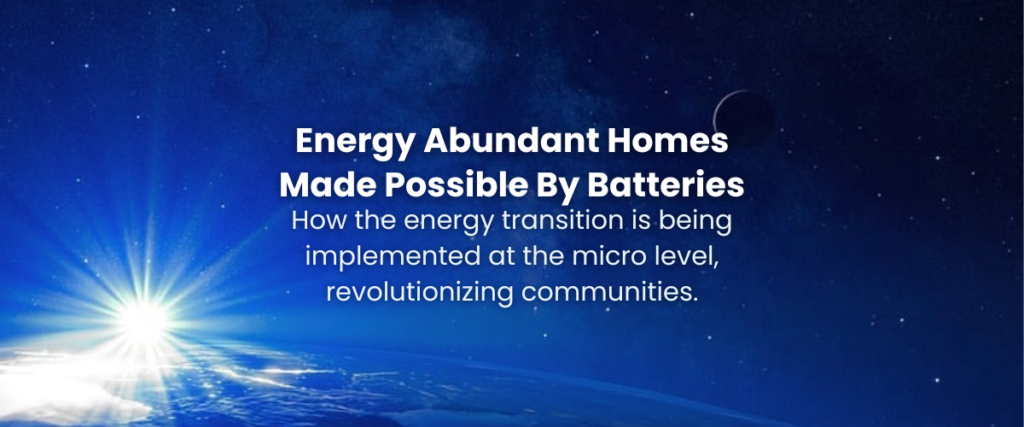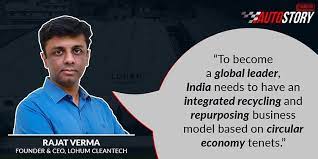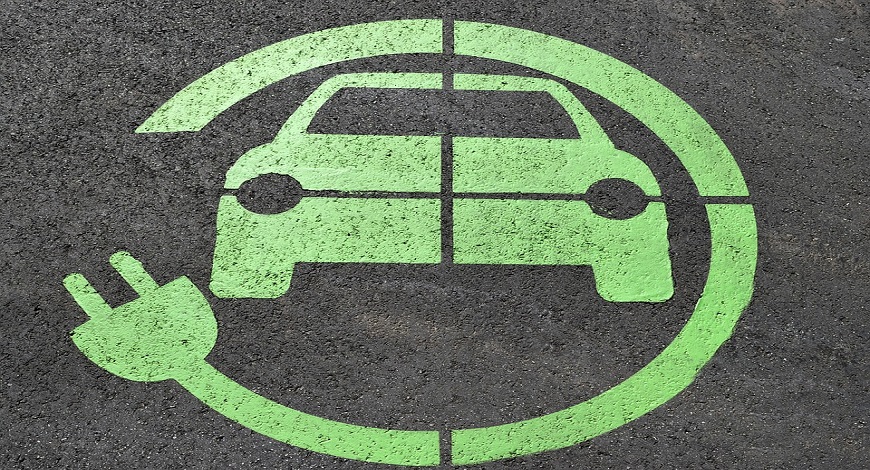
The demand for Li-ion batteries has skyrocketed in recent years owing to their mass utilization across several industries thanks to their versatility and cost-effectiveness in energy storage. The global market for these batteries is expected to surpass the valuation of 150 billion dollars by 2032. Lithium batteries are now increasingly revolutionizing the realm of sustainable housing, which primarily leverages renewable energy sources like sun and wind, along with resource circularity, micro-scale farming, and more. Effective energy storage enables the smart application of sustainable living technologies and helps power necessities as well as IoT functions at home.
Communities looking to transition to sustainable housing can incorporate lithium batteries for uninterrupted and cost-effective power consumption. This edition of the LOHUM Green Gazette is aimed to help you understand how lithium batteries are revolutionizing solar-powered homes and communities.
Solar-powered communities leverage both the power grid as well as fully renewable power sources, depending on the scale and efficiency of the localized green infrastructure. This setup ideally has several solar panels and wind turbines, which harness heat and wind, respectively, to produce electrical energy. The power generated via this setup is sent to a localized grid that powers the community during demanding hours, connected to the larger grids and stations in the region.
As a producer of repurposed Second-Life Batteries (SLBs) for various Energy Storage System (ESS) applications, LOHUM supports and advocates for Lithium Batteries for sustainable housing and solar-powered communities. SLBs made from end-of-life EV batteries are ideal candidates for sustainable home ESS, and we at LOHUM consider battery reuse to be the entryway to a circular economy of energy.
Surplus power stored in these ESSs goes back to the primary utility grid, resulting in reduced energy expenses, and may even be used to generate revenue by selling surplus power to neighboring grids and substations. The conventional problem with this setup is that power delivery is not consistent, thus to alleviate this fundamental barrier, the community can integrate this setup with lithium batteries.
The lithium battery installations can conserve energy when the demand is low and ensure optimal power delivery when renewable sources are unavailable, such as on overcast days, droughts, or weak winds. Furthermore, Li-ion batteries enable load shifting, where excess power is stored during the low-demand phase and released during the demanding hours when the cost of electricity soars abruptly. This leads to reduced energy bills and optimal grid performance.
Despite their compact size, lithium batteries store more energy than lead-acid batteries, leading to amplified performance. This is particularly useful for areas where power outages are frequent.
Lithium batteries are emerging as invaluable power backups by offering efficient energy storage solutions. Here’s how lithium batteries are shaping sustainable housing projects:
Lithium’s atomic bonds store a lot of energy, leading to high energy density. Technically, 1kg of Lithium-ion battery can store up to 150 watt-hours of electricity, which is 6x of what 1 kg of lead-acid battery can accommodate.
Lithium batteries serve as a secondary power solution in the absence of primary power sources. This is beneficial in areas where power infrastructure is poor or yet to be installed.
The ever-increasing dependency on fossil fuels is one of the significant disadvantages of relying on conventional power sources. Lithium batteries undermine this fundamental problem by ensuring amplified energy conservation, allowing households to stay atop unexpected power outages.
Lithium batteries help shave peak power demand and relieve the excess load from the grid. When the off-peak phase arrives, these batteries switch back to energy conservation mode and become active once the primary grid becomes non-functional.
Large-scale lithium battery paired with an intelligent system ensures top-tier grid balancing, keeping power fluctuation under control and ensuring seamless and consistent supply. With energy conservation in the non-demanding phase, these batteries contribute to power requirements whenever the primary grid goes offline.
Owing to modular capabilities, Lithium battery systems enable on-demand adjustment of power delivery, contributing to varying energy requirements. No matter the project size or demand threshold, these batteries can meet any requirements with ease.
Compared with lead-acid batteries, lithium batteries are highly safe and pose zero environmental risk. Despite their compact size and heavy-duty construction, they are easily recyclable, ensuring minimal waste. According to research highlighted by the United Nations, these batteries can serve a service life ranging from 5-10 years, depending on the usage and charging frequency. Longer service life translates to a low discard rate, hence minimal wastages.
Intelligent energy management systems use Lithium batteries to maximize performance and efficacy. The system constantly tracks battery health and voltage fluctuation to optimize the output accordingly. This technology can ensure reliable and long-lasting performance in significantly large solar-communities projects.
Energy management systems are compact yet stackable devices that intelligently oversee solar-powered systems and send back surplus power to the primary grid. These are key to ensuring effective net metering year-round, and efficient power triage capabilities for emergency situations.
Many governments are boosting ongoing renewable energy projects through several schemes and incentives. Coupling these benefits with reduced energy bills can lead to amplified cost savings for eco-friendly housing projects.
The Indian government has taken a significant step in boosting the production of grid batteries. The government proposes a subsidiary scheme worth 2.63 billion dollars until 2030, helping the country to reduce its carbon footprint significantly.
As nations are striving to lower their carbon footprint in the quest for Net Zero and Zero Waste targets, lithium batteries have emerged as the most viable and cost-effective solutions to solve energy limitations. Using them renders several advantages, such as eco-friendly power delivery, net metering, exceptional backup, easy recyclability, longer service life, etc. When used with clean and renewable power sources, Lithium batteries ensure reliable power storage and distribution for solar-powered communities.
Tune in to the LOHUM blog and our LinkedIn page for more insights on the energy transition, sustainability, battery energy, clean transition materials, circular economy, battery recycling, and battery repurposing or reuse.
Related blogs
This entrepreneur wants India to make its own lithium-ion cells for electric vehicle batteries

Forbes India
Rajat Verma already recovers raw materials from used cells at his venture, LOHUM Cleantech. He wants to close the loop by making cells in India as well.
India needs integrated recycling and repurposing battery business model: Rajat Verma of LOHUM Cleantech

YOURSTORY
In an interaction with AutoStory, Rajat Verma, Founder and CEO of LOHUM Cleantech, speaks about building his company, and about battery manufacturing and repurposing as an industry.
Sourcing Raw Materials Is A Big Challenge In Li-ion Battery Space: Founder Lohum

Business World Disrupt
Recognized as ‘The Most Innovative Company of the year 2022’ by The Confederation of Indian Industry (CII), LOHUM is a producer of sustainable Li-ion battery raw materials
1800 572 8822
Email : enquiry@lohum.com
G98, Site, 5, Kasna, Block A, Surajpur Site V, Greater Noida, Uttar Pradesh 201306
LOHUM Cleantech Private Limited, Plot No. D-7 & 8, Site 5th, Kasna Industrial Area, Greater Noida, Gautam Budh Nagar, Uttar Pradesh – 201308
LOHUM Cleantech Private Limited, Plot No. O-17, Site 5th, Kasna Industrial Area, Greater Noida, Gautam Budh Nagar, Uttar Pradesh – 201308